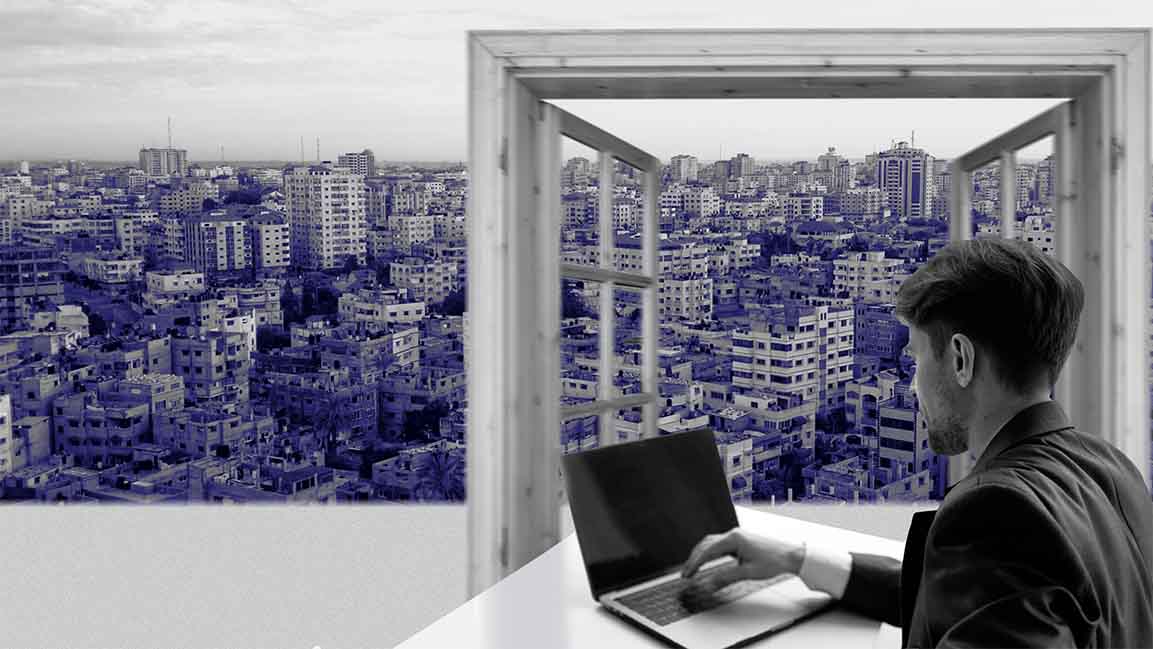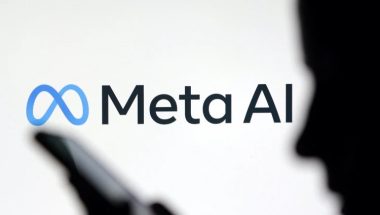- | 9:00 am
Gaza has a huge unemployment challenge. Can remote work solve that?
Increasing numbers of young Gazans are piercing the blockade and unemployment through remote work, expanding their horizons.

In the last couple of years, employees have made some great strides in flexibility. In Gaza, where there is skyrocketing unemployment, remote work has been life-changing for many. Noor Ahel, a 28-year-old architecture graduate who has been jobless for two years in Gaza, is a case in point.
“I took many courses and even thought of going abroad to find a job until I found remote work through Gaza Sky Geeks,” says Noor, a freelance voiceover artist.
“The opportunity to work remotely enables me to offer my services to companies abroad, helps me earn a decent income, and to develop my capabilities,” adds Noor, who is now the primary breadwinner of her family.
From the newest social network to the latest innovations in cloud computing, the way we use technology has advanced and evolved over the past few years and it has fundamentally impacted how we work.
In Palestine, where a recent survey highlights the growing problem of unemployment – in the Gaza Strip, 45% of people of working age are jobless, with the figure standing at 14% in the West Bank, more than anything, these changes in digital and tech have enabled young people to work remotely, be that from home or a tech hub or shared learning space.
One group championing the benefits of remote working and raising awareness is Gaza Sky Geeks. It’s a tech hub and co-working space, which also launched a coding academy, offering young people flexibility over where they live and work. And, crucially, the non-profit helps young graduates get paid.
EARNING A DECENT INCOME
In a region with a chronic electricity crisis — during the war, it is completely cut, Wi-Fi network problems, and economic blockades, Gaza Sky Geeks provides young people with a workspace to deliver work on time, says Noor.
“Arab society should provide job opportunities that make women like me self-reliant,” she adds.
For 29-year-old Muhammad Al-Hanouti, remote work has been a bonanza after a failed business attempt. “After I lost my business, I stopped working for a while. I was a burden to my family and was ashamed to ask for my expenses. It was a huge relief when I found the opportunity to work remotely as a design artist.”
“Life without work is difficult, but this is what thousands of young people in Gaza suffer from,” continues Al-Hanouti, who now supports his family of six.
This suggests young Gazans are piercing the blockade and lack of job opportunities in other ways – through remote work.
An hour of work pays between $30 to $100, and a project can fetch as much as $600. For young people who lack job opportunities, this is decent pay.
“The idea of a remote work academy began in 2015 as an experiment to see if there was a possibility to train young people and help them earn an income,” says Saad Habib, Director of Corporate Programs at Gaza Sky Geeks. “This experiment lasted for nine months. In 2017, we started self-employment and technical training and connected job seekers with companies looking for skills, such as translation, design, programming, accounting, and law.”
DEMOCRATIZING ACCESS TO OPPORTUNITY
He adds, “Every three months, we receive thousands of applications from all over Palestine, including the Gaza Strip and cities in the West Bank such as Ram, Hebron, and Jerusalem.”
What is essential is that business skills are also taught at the academy, and advice and office space are provided to hundreds of would-be entrepreneurs.
In the beginning, one cohort consisted of 50 people, but now 400 are trained in one group, meaning approximately 2,000 people graduate annually.
In 2022, 9,000 Palestinians benefited from Gaza Sky Geeks’ programs, and more than half were women. “For web developers, the average monthly income is $2,300; for designers, the income is $1000 per month, and for writing and translation, the average income is $500.”
Democratizing access to opportunity online has already driven millions of dollars in income to workers in Palestine. According to the non-profit, during the past five years, remote workers in Palestine earned approximately $15 million. It has leveled the playing field for thousands of people in Palestine by reducing inequalities and sparking economic growth.
Aside from the obvious personal benefits for individuals, experts say remote work is important to reduce poverty and unemployment rates in Gaza. They urge technology institutions and incubators to help those wishing to work remotely.
“Remote work plays an important role in employment and reducing poverty rates, not to mention their role in achieving sustainable development,” says Dr. Muhammad Barbakh. “Through technological and digital tools, young people in Gaza can work or provide advisory services.”
He pointed out that developed countries depend on human and technological investment to achieve comprehensive development.
Although remote work is the key to reducing unemployment in Palestine, there is no silver bullet. He says remote work can be a force for good and should be approached positively to influence the trajectory of employment initiatives.
“Remote work benefits the worker, the employer, and society. At the worker’s level, it improves work, increases job satisfaction, and improves the balance between work and family life,” adds Barbakh.
Speaking about remote work, Dr. Musab Sheikh Khalil says, “While it reduces costs for employers, it offers flexibility and a lack of job friction to employees. But the remote worker often has to bear the costs of equipping the home office and its requirements, and there’s a lack of incentives such as health insurance.”
Khalil adds, “remote work in Palestine began with the university graduates in design, production, advertising, and technical jobs, seeking decent jobs, and now people of all age groups are finding that by working remotely, their productivity and well-being are improving.
Years of blockades and tight restrictions on Gaza have been the death of much industry here and the most difficult for young people, as it reduced job opportunities. The successive wars in Gaza added to the woes, as the poverty rate increased to 80%. This is why remote work, somewhat immune to physical barriers, is paying massive dividends as young people increasingly adopt it.







































